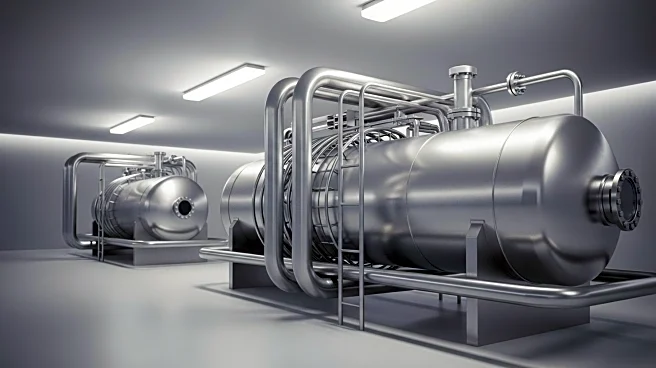What is the story about?
What's Happening?
Nippon Kaiji Kyokai (ClassNK) has granted approval in principle (AiP) to SRC for its Methanol Superstorage design, which utilizes Sandwich Plate System (SPS) technology to significantly increase storage capacity for methanol and ethanol on ships. This innovative design features a solid elastomer core sandwiched between steel plates, offering 85% more storage capacity compared to traditional tanks. The approval confirms the design's feasibility under ClassNK's guidelines for ships using alternative fuels. The Methanol Superstorage design addresses the challenge of methanol's low volumetric energy density, requiring larger tanks to match the energy output of conventional fuels. Panama's expertise was also involved in the review process, granting AiP alongside ClassNK. This approval marks a significant step for SRC in promoting industry acceptance of the Methanol Superstorage solution.
Why It's Important?
The approval of the Methanol Superstorage design is crucial for the maritime industry as it seeks sustainable fuel alternatives. Methanol, with its lower energy density, necessitates larger storage solutions, impacting ship design and range. The innovative SPS technology not only increases storage capacity but also enhances safety with triple barriers for fire protection and leak prevention. This development supports the growing trend of methanol-ready ships, aligning with global efforts to reduce carbon emissions. The ability to retrofit existing vessels with minimal impact further underscores the design's potential to transform fuel storage in the shipping industry, offering a viable path towards greener maritime operations.
What's Next?
Following the approval in principle, the next steps involve obtaining full approval for specific fuel tank designs applied to individual ships. This requires comprehensive documentation and adherence to relevant regulations and guidelines. As the industry moves towards alternative fuels, stakeholders such as shipbuilders and operators will likely explore the integration of Methanol Superstorage into new and existing vessels. The maritime sector may see increased collaboration with regulatory bodies to ensure compliance and facilitate the transition to sustainable fuel solutions. The success of this design could spur further innovation in fuel storage technologies, driving advancements in eco-friendly shipping practices.
Beyond the Headlines
The Methanol Superstorage design not only addresses technical challenges but also reflects broader shifts in the maritime industry towards sustainability. The emphasis on alternative fuels highlights the industry's commitment to reducing environmental impact. This development may influence regulatory frameworks, encouraging more stringent standards for fuel storage and safety. Additionally, the design's ability to retrofit existing ships could accelerate the adoption of methanol as a primary fuel, potentially reshaping global shipping routes and logistics. As the industry adapts to these changes, there may be increased investment in research and development to further enhance fuel efficiency and environmental performance.















